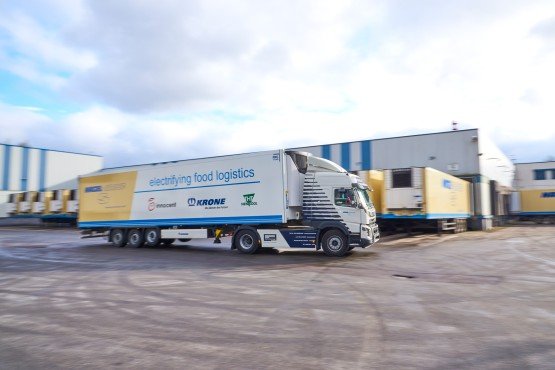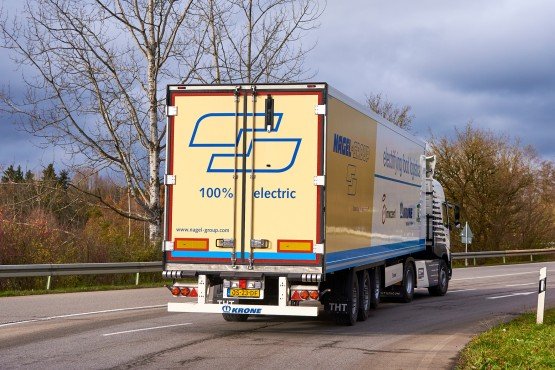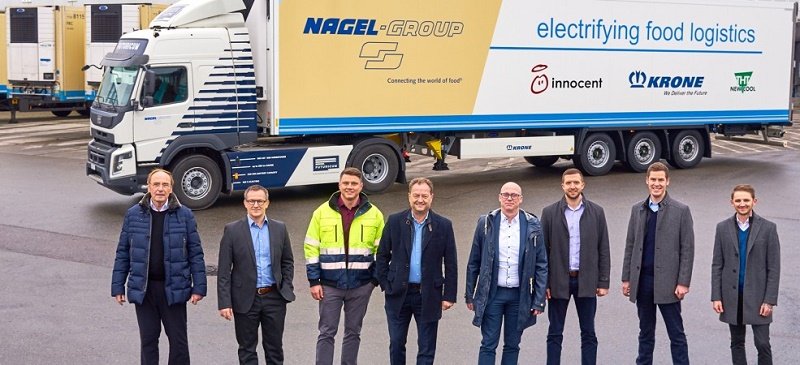The Nagel-Group started its first extensive on-road test of a fully electric 40-ton semi-trailer truck under real conditions. The experiment explores the technical possibilities of an electric tractor unit in combination with an electric semi-trailer in collaboration with the companies innocent drinks, Designwerk Products AG, THT Heetkamp and Fahrzeugwerk Bernard Krone.
"Electric motors are currently the subject of intense debate. We want to draw conclusions of our own and, together with our partners, identify the conditions under which the energy-intensive segment of refrigerated logistics benefits from electric trucks technically and economically," says Carsten Taucke, CEO of the Nagel-Group.
Working with the smoothie and chilled juice brand innocent drinks, the food logistics company has selected existing transports, which will be carried out with electric vehicles for a trial period. "Being responsible is an essential company value for innocent, which drives our quest to become a truly sustainable business – that also applies to our supply chain. That is why we put much emphasis on environmentally friendly transport solutions and why we immediately agreed to participate in this trial," says Jonathan Banks, Head of Logistics, at innocent drinks.
The truck is used within the context of a shuttle service. The electric truck commutes between the production site in Stockach, Baden-Württemberg and the Kraftverkehr Nagel branch in Deißlingen several times a day to transport apple juice. The one-way distance is around 60 kilometres and requires up to two hours of active cooling.
"The unique feature of our test is that we are relying only on electric power for the first time. The electric tractor unit hauls a refrigerated semi-trailer, which is also electrically powered. This way, we can execute large transport operations without local CO2 emissions for the first time," explains Arthur Ebel, Supervisor Fleet Management at the Nagel-Group.
The tractor unit used is the Futuricum Semi 40E made by the Swiss company Designwerk Products AG. The electric truck has four engines, a total power of 680 HP and a range of up to 380 km. The vehicle has already been deployed successfully in distribution, recycling and construction logistics. "With this test, we aim to prove that our tractor unit can also meet the high demands of refrigerated logistics," explains Fabian Wyssmann, Sales and Marketing Manager at Designwerk Products AG. Two batteries are the centrepiece of the electric vehicle, each with a capacity of 170 kWh. The charging time differs depending on the charging station. "It takes the Futuricum just over two hours to recharge," says Wyssmann.
The Futuricum is used in combination with the fully electric refrigerated semi-trailer of the company Krone, which is equipped with the technology of the Dutch company THT Heetkamp. In addition to powerful batteries, it utilises, in particular, energy recovery using the axle. "Braking produces an awful lot of energy. Using our recuperation technology, we can recover some of it and recharge the batteries during transport," says Twan Heetkamp, Director of THT Heetkamp.
“A special feature of the trailer is that the batteries have shifted the weight more to the middle of the trailer. This has the advantage of an optimized weight distribution even with partial loads," says Ingo Geerdes, Managing Director Key Accounts at Krone. "In addition, we are always extremely open to new, innovative solutions and are very happy to support co-operations for more sustainable transport such as this."
The electric semi-trailer is still in the trial stage and will undergo a total of three months of testing by the Nagel-Group. For instance, it will also be employed together with a conventional truck in the Ruhr area. "In the coming weeks, we will carry out a thorough evaluation of energy consumption, range, as well as driving characteristics, and incorporate the results into our considerations for the further modernisation of our fleet. Moreover, we will use the test data to evaluate the feasibility and the economics of such fully electric transports," explains Taucke.



